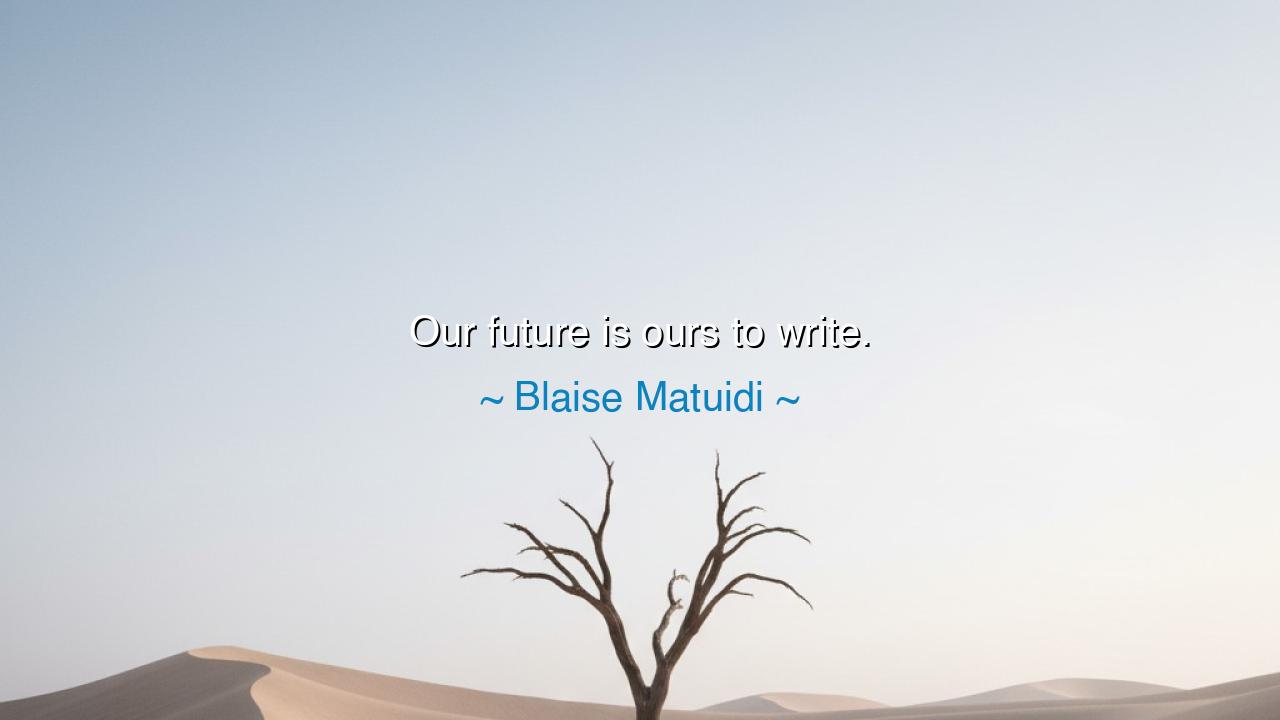
Our future is ours to write.






"Our future is ours to write." These powerful words from Blaise Matuidi carry a profound message about agency and the power each individual holds in shaping their own destiny. In an age where many feel overwhelmed by forces beyond their control—be it society, family, or circumstance—Matuidi’s quote serves as a reminder that the future is not a predetermined path, but one we actively craft with each decision we make. It is the great gift and responsibility of being human: to have the ability to create and define the life we wish to lead, regardless of past struggles or external pressures.
In the ancient world, the idea that the future could be shaped was both a source of great hope and great burden. The Greeks, particularly through the teachings of Socrates and Plato, believed that the purpose of life was to strive toward wisdom and virtue, and that by doing so, one could influence their future. Socrates, when asked about the future, often emphasized that it was not the world’s circumstances that determined a man’s fate, but rather his own choices and the pursuit of moral excellence. Just as Matuidi suggests, the future is written by those who live consciously, making decisions that align with their values and purpose.
Take the example of Alexander the Great, whose future seemed destined for greatness. Born to a king and tutored by Aristotle, Alexander could have easily followed a path set before him, but instead, he took control of his future, expanding his empire far beyond anything imagined. He was not a passive observer of fate, but an active participant, carving out his destiny through decisions that would shape the world for centuries to come. Alexander’s story is a vivid testament to the idea that we hold the pen to write the future, no matter our station in life.
Similarly, the Romans, in their concept of virtus, believed that each individual had a role to play in the larger story of Rome. The great Roman generals and statesmen, such as Julius Caesar, understood that the future was not a passive waiting game. They wrote their future with action, strategy, and an unwavering belief that the course of history was shaped by those who dared to make bold moves. Caesar’s crossing of the Rubicon was not simply a military decision; it was a declaration that the future was his to mold. This relentless will to shape destiny is at the heart of Matuidi’s words—the future is ours to craft with the choices we make today.
In modern times, Nelson Mandela’s story is another poignant example of how the future is written by the choices we make. After spending 27 years in prison, Mandela could have easily resigned to despair or bitterness, letting the past define him. Instead, he chose a future of forgiveness, reconciliation, and peace. His actions created a new era for South Africa, one that shifted from apartheid to a vision of unity. Mandela’s courage to rewrite his future was not just for himself, but for an entire nation, showing that even in the darkest of circumstances, we hold the power to define the course of our lives.
The lesson of Matuidi’s quote is one of empowerment. Too often, we allow external circumstances to dictate how we see our future—our upbringing, our environment, our failures—but the truth is, the future is always ours to shape. We may not control everything, but we do control how we respond to challenges, how we learn from the past, and how we align our actions with our values. Writing our future is about embracing the freedom and responsibility to choose the path forward, no matter how difficult or uncertain.
So, how can we take this wisdom and apply it practically? The first step is to claim ownership of our lives. Recognize that each choice we make today—however small—has the power to shape the future. When faced with obstacles, instead of succumbing to despair or passivity, ask yourself: How can I act in a way that aligns with the future I wish to create? Whether in our personal growth, careers, relationships, or even in the way we respond to the world’s challenges, we are always writing our future. The actions we take today lay the foundation for the world we will live in tomorrow.
In closing, remember this ancient truth: the future is written by those who dare to dream, to act, and to persist. Let us take control of the pen, and through our decisions, our actions, and our beliefs, craft a future that reflects our highest ideals. The future is not a distant, mysterious force; it is a landscape we are actively shaping with every thought, every choice, and every step we take. The journey is long, but with each moment, we add our own chapter to the story of our lives, a story that we have the power to write with purpose and intent.






AAdministratorAdministrator
Welcome, honored guests. Please leave a comment, we will respond soon